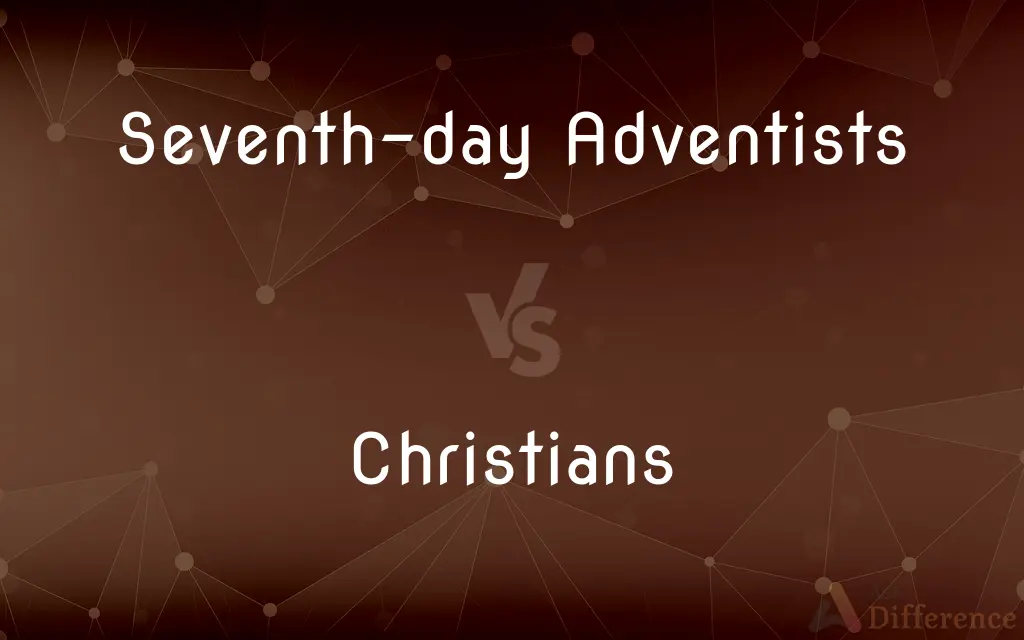Seventh-day Adventists vs. Christians — What's the Difference?
Edited by Tayyaba Rehman — By Maham Liaqat — Published on March 6, 2024
Seventh-day Adventists are Christians with specific beliefs like Sabbath on Saturday and health laws, distinguishing them from other Christian denominations focusing on Sunday worship.

Difference Between Seventh-day Adventists and Christians
Table of Contents
ADVERTISEMENT
Key Differences
Seventh-day Adventists (SDAs) are a denomination within Christianity, emphasizing the observance of Saturday, the seventh day of the week, as the Sabbath. This contrasts with most Christian denominations, which celebrate Sunday, the first day, as their day of worship. This difference highlights the SDA focus on adhering closely to the practices of the early Christian church.
SDAs have a unique dietary law, advocating for vegetarianism based on health and spiritual principles, which is not commonly mandated across other Christian denominations. This aspect underlines the Adventist emphasis on the holistic well-being of the body and spirit, a belief derived from the biblical "body as a temple" concept.
The doctrine of the investigative judgment is a core belief unique to SDAs, suggesting a pre-advent judgment that began in 1844. This is distinct from the broader Christian view of judgment happening post-resurrection and Second Coming, showing the SDA emphasis on living a life of purity in preparation for Christ's imminent return.
SDAs also place a significant emphasis on the prophetic ministry of Ellen G. White, whom they consider a prophetess. This contrasts with other Christian groups that may not recognize modern prophets or hold any individual's writings on par with the Bible.
Despite these differences, SDAs share core Christian beliefs in the divinity of Jesus Christ, the Trinity, salvation through Jesus, and the authority of the Bible. This common ground underscores that while SDAs have distinct practices and beliefs, they are firmly within the Christian tradition.
ADVERTISEMENT
Comparison Chart
Sabbath Observance
Saturday (Seventh day)
Sunday (First day)
Dietary Laws
Encourage vegetarianism
No specific dietary laws
Core Beliefs
Investigative judgment, Ellen G. White's writings
Diverse, without these specific beliefs
Health Principles
Emphasis on health and wellness
Varied emphasis
Eschatology
Unique views on end times and prophecy
Diverse views on end times
Compare with Definitions
Seventh-day Adventists
Emphasizes health and wellness as part of religious practice.
Health seminars and vegetarian cooking classes are common in SDA communities.
Christians
Generally worship on Sunday, the traditional Christian Sabbath.
Most Christian churches hold services on Sunday mornings.
Seventh-day Adventists
Advocates for a vegetarian diet based on biblical principles.
Many Seventh-day Adventists follow a vegetarian diet for health and spiritual reasons.
Christians
Hold diverse beliefs about eschatology and prophecy.
Christians have varying interpretations of the end times and the role of prophecy.
Seventh-day Adventists
Shares fundamental Christian beliefs in Jesus Christ and the Bible.
Seventh-day Adventists hold Bible studies and evangelistic meetings to share the gospel.
Christians
Dietary practices vary widely with no specific restrictions.
Dietary choices among Christians are often based on personal or cultural preferences.
Seventh-day Adventists
Believes in the investigative judgment and the prophetic role of Ellen G. White.
Seventh-day Adventists study the writings of Ellen G. White for spiritual guidance.
Christians
Focus on spiritual health, with varying views on physical health.
While many Christians pray for health, practices related to diet and wellness vary.
Seventh-day Adventists
A Christian denomination that observes the Sabbath on Saturday.
Seventh-day Adventists attend church services on Saturday.
Christians
Believe in the core tenets of Christianity such as the divinity of Jesus and salvation through faith.
Christians celebrate the life, death, and resurrection of Jesus Christ in worship.
Christians
Professing belief in Jesus as Christ or following the religion based on the life and teachings of Jesus.
Christians
Relating to or derived from Jesus or Jesus's teachings.
Christians
Manifesting the qualities or spirit of Jesus, especially in showing concern for others.
Christians
Relating to or characteristic of Christianity or its adherents.
Christians
One who professes belief in Jesus as Christ or follows a religion based on the life and teachings of Jesus.
Christians
One who lives according to the teachings of Jesus.
Christians
Plural of christian
Common Curiosities
What day do Seventh-day Adventists observe the Sabbath?
Seventh-day Adventists observe the Sabbath on Saturday, the seventh day of the week.
Do all Christians follow the dietary laws of Seventh-day Adventists?
No, the specific vegetarian dietary laws are unique to Seventh-day Adventists and not a widespread practice among all Christians.
What is the investigative judgment that Seventh-day Adventists believe in?
The investigative judgment is a doctrine specific to Seventh-day Adventists, suggesting a pre-advent judgment that began in 1844, assessing the lives of people to determine their eligibility for salvation.
Do Seventh-day Adventists celebrate traditional Christian holidays?
Seventh-day Adventists celebrate some traditional Christian holidays, but their observance may vary based on their focus on Sabbath and their interpretation of biblical teachings.
How do Seventh-day Adventists view Ellen G. White?
Seventh-day Adventists regard Ellen G. White as a prophetess whose writings provide guidance and insight, but they do not place her writings above the Bible.
What is the significance of health and wellness to Seventh-day Adventists?
Health and wellness are seen as integral to spiritual life and purity, reflecting their belief in the body as a temple of the Holy Spirit.
What makes Seventh-day Adventists unique in their worship practices?
Their Saturday Sabbath observance and the incorporation of health and wellness teachings into their spiritual practices make them unique.
Are Seventh-day Adventists considered Christians?
Yes, Seventh-day Adventists are Christians with specific beliefs and practices that distinguish them within the broader Christian community.
Is the belief in the Trinity common among Seventh-day Adventists and other Christians?
Yes, both Seventh-day Adventists and most other Christian denominations share a belief in the Trinity.
Can someone be a Seventh-day Adventist and not be vegetarian?
Yes, while vegetarianism is encouraged among Seventh-day Adventists, it's not mandatory for membership.
What role does prophecy play in Seventh-day Adventism?
Prophecy, including the interpretation of biblical prophecies and the role of Ellen G. White as a modern prophetess, plays a significant role in Seventh-day Adventist belief and practice.
How do Seventh-day Adventists differ from other Protestants?
Their Sabbath observance on Saturday, dietary laws, and specific doctrines like the investigative judgment and the role of Ellen G. White distinguish them from other Protestant denominations.
Are there any Seventh-day Adventist practices adopted by other Christian denominations?
While some individuals in other denominations may adopt similar health practices or study Ellen G. White's writings, these are not widely incorporated into other denominations' doctrines.
How do Seventh-day Adventists interpret the Bible compared to other Christians?
Seventh-day Adventists interpret the Bible through the lens of their specific doctrines but share the belief in its authority and inspiration with other Christians.
How do Seventh-day Adventists view salvation?
Seventh-day Adventists believe in salvation through faith in Jesus Christ, similar to other Christians, but emphasize living a life in accordance with God's law as evidence of faith.
Share Your Discovery

Previous Comparison
Head Of State vs. President
Next Comparison
Green Goblin vs. HobgoblinAuthor Spotlight
Written by
Maham LiaqatEdited by
Tayyaba RehmanTayyaba Rehman is a distinguished writer, currently serving as a primary contributor to askdifference.com. As a researcher in semantics and etymology, Tayyaba's passion for the complexity of languages and their distinctions has found a perfect home on the platform. Tayyaba delves into the intricacies of language, distinguishing between commonly confused words and phrases, thereby providing clarity for readers worldwide.
















































